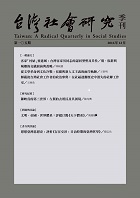
《台灣社會研究季刊》 第105期:

【一般論文】
客家「村姑」要進城:台灣客家男同志的認同型塑及其性/別、族群與城鄉的交織展演與政略/林純德(105 民105.12 頁1-60)
本文企圖挑戰某種「同志缺席」(queer-free)的在地客家研究及「客家缺席」(Hakka-free)的在地同志研究的學術氛圍,期以再現多重繁複的性/別與族群反抗政略,並召喚一群擁有客家認同的男同志,藉由述說我們那充滿「怪胎反轉羞恥」及「敢曝樂趣」且交織著性/別、族群與城鄉的主體展演與反抗政略的故事,既「酷異化」在地客家學界內的性別研究論述,也「族群化」在地的同志研究。本文主要探究的問題可歸結為:一、何謂「客家男同志」?如何從性/別、族群及城鄉的交織視野來加以審視?二、在地客家男男情慾互動與身份認同型塑的歷史演變為何?三、家族/家庭中的親屬關係如何影響在地客家男同志的性/別及族群認同的型塑與展演?四、在地客家男同志與其他族群身份認同的男同志之間的互動關係為何?五、在地客家男同志的性/別、族群與城鄉的交織展演與政略在同志社群及客家族群內發揮何種效應?六、客家母語對於在地客家男同志的性/別及族群認同的型塑與展演的影響力為何?如何影響?本文採取質性研究的取徑,具體的研究方法則揉合了線上文本分析及線下深度訪談。
關鍵詞:客家、男同志、城鄉、離散、交織性、羞恥、敢曝
This paper aims to disrupt both the “queer-free” phenomenon within local Hakka studies and the “Hakka-free” phenomenon within local queer studies. It calls for radical, yet complicated, queer politics inscribed by the intersectionality of gender, sexual, ethnic and urban-rural differences by rallying local Hakka male queers like me. By dint of telling our shameful, campy stories, we are determined to “queer” Hakka gender studies and to “racialize” local queer studies. The main questions looked into in this paper include: (1) How do we define Hakka male queers? (2) What is the socio-cultural context from which local Hakka queer activism arises? (3) How does kinship impinge upon gender/sexual and ethnic identities among local Hakka male queers? (4) How do local Hakka male queers interact with those of other ethnic groups? (5) How does the intersectionality of gender, sexual, ethnic and urban-rural performativities and politics among local Hakka male queers impact upon both local queer and Hakka communities? (6) How does the Hakka language influence identity formation among local Hakka male queers? This paper employs a qualitative approach by adopting a combination of online text analysis and offline indepth interview.
Keywords: Hakka, male queer, urban-rural, diaspora, intersectionality, shame, camp
從文學革命到文化冷戰:侯健與新人文主義的兩岸軌跡/王智明(105 民105.12 頁61-101)
當代中港台文學的分流與交會,與1947年後全球冷戰分斷體制的建立,有著密切的關係。然而,僅僅以美蘇對抗的歷史分期來理解冷戰,無法充份貼近兩岸三地的歷史經驗,因為國際冷戰同時疊合著國共內戰的軌跡,分斷體制實為一個至今依然穩固的雙戰構造。如何重新理解冷戰與內戰的關連,乃是東亞冷戰研究的重要課題。本文將以渡台文人侯健的文學批評為中心,透過他的文字與思想,來追索兩岸的冷戰經驗是如何在文學創作與批評的場域裡展開的。作為梁實秋的弟子與新人文主義的傳人,侯健的著作(含評論、研究與譯作),一方面反映了新人文主義的文學品味與政治脾性,另一方面則對「從文學革命到革命文學」的思想進程進行了整理與批判。他所提出的「民生文學說」正是對抗社會主義文藝思想的利器。他對文學的政治性與民族性的思考,不僅反映了文學思想如何受到冷戰意識型態的制約,更突出了一條「從文學革命到文化冷戰」的思路,至今仍在兩岸三地的文化與政治空間裡發酵和作用著。
關鍵詞:侯健、新人文主義、民生文學說、冷戰分斷、國共內戰
This article is an attempt to rethink the Cold War discourse in the West by injecting a discussion of the Chinese Civil War as its constitutive experience. It focuses on the work of Hou Chien, a Chinese literary critic in Taiwan, as an entry point for linking the Cold War and the Chinese Civil War with the aim of understanding the Division System across the Taiwan Strait and beyond. It contends that the Division System is built upon both the Cold War and the Chinese Civil War, and therefore an understanding of how the Civil War was—and still is being—fought across the Taiwan Strait is crucial to the critique of Cold War discourse in the West. More specifically, it regards Hou’s New Humanist work in the 1970s as intersecting with the dual-war structure to project a “Chinese” future that will be built upon a critical reflection of the modernity legacy in the West. Reading Hou’s works in literary criticism within this geopolitical context also suggests the possibility of understanding the political character of New Humanism in the dual contexts of the Cold War cross-Taiwan Strait politics.
Keywords: Hou Chien, New Humanism, Thesis on Literature for Life, Cold War Division, the Chinese Civil War
解嚴後台灣社會工作者的政治參與:在社福運動歷史中消失的社聯工作室/王增勇(105 民105.12 頁103-151)
社會工作者本身溫暖的專業形象,加上台灣的社會運動鮮少看到社工的身影,社工普遍被認為是保守且不熱衷參與政治,但社聯工作室的歷史推翻了這樣的論述。本文透過文獻歷史檔案分析與當事人訪談,試圖勾勒社聯工作室這段尚未被學界記錄的歷史,並分析社聯工作室的政治參與方式。社聯工作室的歷史反映了解嚴後的社工面對正在成形的代議民主政治,積極地透過各種政治參與方法,試圖改變國家資源分配的模式。社工文獻中所提及各種政治參與方式幾乎在社聯工作室的歷史中都曾出現,可見社聯工作室政治參與的廣度。社聯工作室對於台灣社會福利運動的影響有二:社聯工作室所催生的各種福利使用者組織與聯盟團體,奠定了現有社福倡議組織的基礎;其次,社聯工作室所發展的對預算監督與立法倡導成為後續社福組織影響政策的主要模式。但隨著社福運動的成功,個別倡議組織進入體制所獲得的政治資源造成社聯工作室所期待的合作與共享難以維繫,在1998年停止運作。
關鍵詞: 政治參與、社工專業、政策倡導、基進社工、歷史研究
The political participation of social workers in Taiwan is generally considered low. However, the Council of Social Services, organized by a group of social workers from the voluntary sector, challenged this assumption. The history of the Council is documented and analyzed in this essay through document analysis of the Council’s publications and in-depth interviews and focused group interviews with its key participants. The history of the Council shows social workers of that time were aware of the advent of representative democracy and were actively learning various kinds of political skills to be politically effective. The Council tried to form grass-root organizations and conduct administrative lobbying, legislative advocacy and electoral campaign. The findings show that the scope and depth of political participation of the Council covered almost all the political skills of social workers that had been mentioned in social work literature. The coalition model among grass-root groups developed by the Council has laid the foundation for social welfare movements in the current representative democracy of Taiwan. The capacity to influence and monitor the budgets and legislations of the state, developed by the Council, has been proved to be the key to the effectiveness of advocacy. However, the tension between political involvements with the state and the autonomy of advocacy groups remains uneasy to balance.
Keywords: political participation, social work, policy advocacy, radical social work, history research
【研究紀要】
陳映真的第三世界:左翼的去殖民及其困境/陳光興(105 民105.12 頁153-220)
「社會主義」與「去殖民」存在著什麼樣的歷史關係?本文指出去殖民工作在戰後至今沒有能夠系統性地展開,關乎全球冷戰結構的出現,攔截、延宕了反思運動的契機,去殖民幾乎在歷史中僅僅等同於「獨立/建國」。但是放在東亞區域史來觀察,社會主義運動是極為關鍵的動力,在中國大陸、韓半島、越南等地取得了巨大的進展,成為區域內(外)左傾份子認識世界的基本依託。因此思考去殖民問題時勢必為國際共產運動所牽引。換句話說,我們必須重新清理:第三世界的左翼如何在歷史中看待、處理、思索去殖民問題?帶著上述的問題意識,本文重訪陳映真小說中的第三世界,試圖追溯戰後五、六十年間,作家立足於從隱晦到清晰的左翼位置,是如何書寫、面對新/後/殖民狀況。本文主要討論了〈故鄉〉、〈兀自照耀著的太陽〉、〈唐倩的喜劇〉、〈忠孝公園〉這幾篇小說,呈現的是陳映真在1960年至2005年不斷在思索這個沒完沒了的問題,他知道這是台灣與祖國重新縫合的核心障礙,最終他沒有答案,但至少是三邊得共同面對的問題。
關鍵詞: 陳映真、第三世界、社會主義、去殖民、精神狀況
What is the historical connection between socialism and decolonization? This essay argues that the reason why decolonization failed to unfold in a systematic way in the postwar years had something to do with the emergence of global Cold War structure, which intercepted and postponed this crucial project, so that decolonization, historically speaking, became no more than the independence and nation-building of individual countries. However, in East Asia at the same time, socialism occupied such pivotal positions with its great successes in the Mainland China, the Korean Peninsula, and Vietnam. So much so that many leftists inside and outside the region relied upon it as their frame of reference. This juxtaposition prompts us to reexamine how the Third World leftists viewed, tackled, and faced up to decolonization. With this problematic in mind, this essay revisits the Third World in Chen Yingzhen’s fiction by tracing his representations of the neo/post/colonial condition as his leftist conviction grew from vague to firm. By reading closely his short stories “Home Country,”“The Comedy of Tangqian,” “The Sun That Shines On,” and “Zhongxiao Park,” this essay hopes to demonstrate how Chen has been
consistently concerned with this issue from 1960 to 2005, because he was fully aware of its being the core obstacle to the reunification of Taiwan and China. Although devoid of an answer in the end, he at foregrounded it as a problem that has to be dealt with by all sides involved.
Keywords: Chen Yingzhen, Third World, socialism, decolonization, mental condition
【問題與討論】
文明、帝國、世界體系:評趙汀陽《天下體系》/甯應斌(105 民105.12 頁221-231)
【書介與評論】
想想臺灣思想史:評析《存在交涉:日治時期的臺灣哲學》/藍弘岳(105 民105.12 頁233-250)

